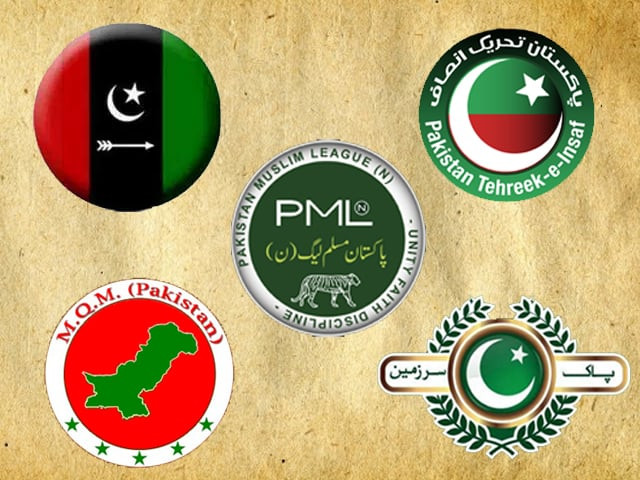Since the 2013 General Election, Pakistan has been in a state of political and administrative commotion. The government has been trying its hands to gain favour from international players while maintaining its voter base in Punjab, while the opposition has been trying to derail the government and bring about early elections.
Imran Khan’s dharna after the infamous “rigging” was the first real threat to the government, with the opposition marching from Lahore and sitting on Islamabad’s streets for several months on end. For a moment, it looked like the dharna would produce the results that the opposition wanted, but the government held on, turning the protest into an extended concert and dance party.
One of Pakistan’s biggest tragedies gave Imran the face saving opportunity to exit from the quagmire he had created for himself. The dharna was called off after the Army Public School (APS) massacre in Peshawar, when numerous quarters criticised Imran for not giving attention to the province where his party held the provincial government.
At that point in time, Nawaz Sharif looked unassailable and his government rock solid. Not only had it survived the Model Town backlash, it had also seen off the tabdeeli (change) at D-Chowk. However, it was not for long. The opposition got its big break when the Panama Papers controversy broke internationally, leading to the resignation of numerous heads of states and politicians abroad. The Panama Papers investigation finally led to the disqualification of the then prime minister, Nawaz Sharif, who had to handover the reigns of the government to Shahid Khaqan Abbasi. The Pakistan Muslim League-Nawaz (PML-N) was undeterred by this monstrous loss, and enacted legislation to re-elect Nawaz as the leader of the party.
Despite what the opposition says, I still believe that this government will live out its five years in office. There will be no early elections. There was a time during the Faizabad protests which beckoned the dissolution of the government ‘by its own design’, however, that did not come to fruition.
So how will the 2018 election, the other season in Pakistani politics, fare on our political parties? Here is my take on it.
Sindh
Sindh is the province where the urban-rural divide is most prominent. The more urbanised cities vote differently from the rural ones, and there have only been two main players in the market – the Muttahida Qaumi Movement-Pakistan (MQM-P), and the Pakistan Peoples Party (PPP). There are of course other parties in Sindh, like Jeay Sindh Qaumi Mahaz (JSQM), Awami National Party (ANP), Jamaat-e-Islami (JI) and Pakistan Muslim League-Functional (PML-F) led by Pir Pagara, but they have too little influence to be of any weight in the whole process at the moment. The urban/rural population split is quite dramatic in Sindh; therefore it’s safe to assume that PPP will win the rural seats along with some of the urban seats.
Rural Sindh is not only the spearhead of PPP’s election campaign; it is also quietly working towards making Sindh more politically effective in the National Assembly (NA). I happened to visit Sukkur a while back and had a long conversation with one of the locals. He lamented the maladministration of the Sindh government in the city, as well as the localities connected to the city. However, he also related something more shocking, that the average number of children per household is on average more than 10, saying,
“One of my brothers has 24 children, and another close to 20.”
The Sindh government is tacitly allowing this, despite the fact that we cannot possibly bear the brunt of a large, uneducated and underprivileged population which requires programs like the Benazir Income Support Program (BISP) to survive. I guess they are thinking if they cannot secure more votes and parliamentary seats one way, they should have a large zombie population to vote for them and win the election that way instead.
Urban Sindh elections will be a lot more interesting with the rise of the Pak Sarzameen Party (PSP) in Karachi. The party, led by renowned former mayor of Karachi, Mustafa Kamal, has been making long yet quiet inroads into Karachi as well as other urban centres of Sindh. With their agenda being nationalistic rather than on the ethnicity most of its members belong to, they have managed to become quite popular in a short period. They even managed to receive welcome from areas formerly life-threatening for Muhajirs, such as Kati Pahari and Lyari. According to estimates, the party is closing in on a 100,000 party members, which for a year and a half of work is quite impressive.
To top it off, MQM-P was ready to merge into PSP with both re-emerging as a new political entity, till the Muhajir workers of MQM-P mutinied and gave Farooq Sattar no choice but to retract his statements and play the resign and then take it back game, ala Altaf Hussain. PSP has the advantage of being underestimated by other established parties, which may give them an element of surprise; however, on the other side of the coin, PSP needs to be extremely wary of the emotional attachment large sections of Karachi’s population still feel for Altaf.
The vote in Karachi and Hyderabad will go down to the wire and the seats will be split between the MQM-P and the PSP. However, it is my guess that PSP will fare much better than what people are predicting for them.
The Pakistan Tehreek-e-Insaf (PTI), which gained relatively high support from the masses in Karachi, will see a significant downturn in their voter numbers. Their consistent anti-Nawaz rhetoric along with their failure to deliver anything meaningful in K-P has broken many a hearts. Time has toned down the ‘Imran fever’ in the urban areas of Pakistan.
Punjab
There is unfortunately only one way the Punjab vote will go, and that is to Nawaz Sharif and PML-N. Despite his disgrace from politics, Nawaz will manoeuvre his brother Shehbaz to take over the mantle as prime minister when they win the elections. Shehbaz has been working diligently within the province since the Sharif brothers return to Pakistan, post-Musharraf. Always found in the role of Chief Minister Punjab, Shehbaz has been building the province and winning support across PML-N’s primary voter base. He has gone so far out as to send youths from Punjab to China to learn their language, a project that was also earmarked for the youth of Balochistan. While Balochistan has yet to benefit from such schemes, as far as Punjab is concerned, they have had the desired effect.
There is a reason why many people from other provinces call the state of Pakistan a ‘government of the Punjab, by the Punjab, for the Punjab’.
Maryam Nawaz is touted to be the next chief minister of Punjab, provided of course the courts do not decide against her in the #Fontgate trial underway. If convicted, she may be disqualified like her father. In that case, Hamza Shehbaz will take over from his father as chief minister of Punjab.
PTI’s fortunes in Punjab will dwindle from the last time round, and they may not be able to win more seats than they did last time. The abandonment of stalwarts like Javed Hashmi has dented the party immensely in the Punjab. While the Supreme Court verdict will help Imran’s credibility, whether this victory will convert into votes is another story altogether.
Balochistan
As is with every oppressed segment in society, Balochistan’s seats are too little to cause any stir in national politics. With the insurgency largely under control, PML-N will probably be making new alliances to hold on to power and retain their coalition government in Balochistan. The religious parties have been on a roll since their Faizabad victory, but that will hardly make an impact in Balochistan, where the Jamiat Ulema-e-Islam-Fazl (JUI-F) and the like were not involved in the protests. The PPP is trying its hand at making inroads, but as of now, it seems not much will change the political landscape of the province.
It would be wise for political parties to pay heed to the banned organisation issue within Balochistan. The constant oppression and genocide of the Hazara community within Quetta, the regional capital and its outskirts, has raised numerous questions regarding the role of local politics in the whole situation. Any mainstream party which demonstrates the resolve to solve this issue will be banking on the support of the Hazara and related communities in the elections. However, if history has shown us anything, it is that cowardice is the most prevalent trait in our politicians.
Khyber Pakhtunkhwa (K-P)
K-P is a complex region of numerous ethnicities that coexist with the influence and liaison of neighbouring Afghanistan. Despite the stereotypes associated with the region, K-P has remained at the forefront of adopting new political thought for their own benefit. They embraced PTI in the last elections, and will probably stick by them in the coming election as well. However, PTI needs to be careful, as the ever-flipping Fazlur Rehman may cause him some problems. PML-N will also be pushing for more control within the province, and since JUI-F always sides with the party which gives them more ‘fodder’, PTI will eventually find that JUI-F will support PML-N once again.
Another problem facing the PTI is the latent anger that the youth of the party feels towards its leadership. The meteoric rise of PTI was based on an anti-corruption rhetoric and youth leadership concepts, which they tried to introduce to the general masses, but as soon as the party gained traction, the tickets went to the old men who were once members of condemned parties and relegated agendas. This disenchantment, which has shown its colours in several PTI meetings due to the disenfranchisement of young workers, will definitely influence the upcoming election where other parties will definitely pander to this segment.
Verdict
Like it or not, there is a good chance that PML-N will win again. Bilawal Bhutto Zardari may be endearing to some, but he is a ‘toothless tiger’ who reads speeches written out for him by his father’s advisors. Most people may not know this, but the party which wins the parliamentary seats on both sides of the Grand Trunk (GT) Road chooses the prime minister. Therefore, the primary aim of both, PML-N and PPP, is to win as many seats on that belt as possible. The most interesting election, however, will be in Karachi and Hyderabad, where PSP will battle it out with their former friends and colleagues in MQM-P, with both sides knowing each other’s strengths and weaknesses.
Pakistanis never vote based on standards of governance or administrative performance. We vote on our perception and more importantly, on ethnic lines. Punjab will support the Punjabi, Sindh will support the Sindhi, and so on. If this were not the case, parties would never have had provincial strongholds despite their gross negligence and maladministration.
To be more truthful, Pakistan lacks the basic prerequisites for a functioning democracy. There are no public educational standards to speak of and the awareness that goes with it is non-existent. We vote with our emotions and unfortunately with our stomachs in rural areas. Such votes are called ‘Biryani’ votes and sadly, these are the ones that decide the fate of Pakistan. The coming months will be decisive in shaping the fate of the 2018 election, and given the current political climate, it is only anyone’s guess how the election will truly unravel this time around.



COMMENTS
Comments are moderated and generally will be posted if they are on-topic and not abusive.
For more information, please see our Comments FAQ